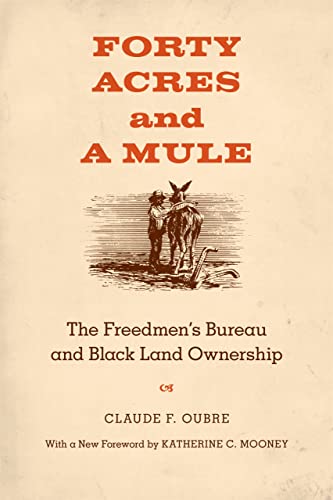Forty Acres and a Mule
The Freedmen's Bureau and Black Land Ownership
Claude F. Oubre
BOOK REVIEW

In the profound and often overlooked narrative of American history lies Forty Acres and a Mule: The Freedmen's Bureau and Black Land Ownership by Claude F. Oubre-an evocative exploration that digs deep into the ashes of the Civil War and the shimmering light of hope that flickered amid the ruins. This book doesn't merely recount facts; it scratches the surface of a vital yet painful chapter, prompting reflections that echo throughout the fabric of our society today.
For many, the phrase "forty acres and a mule" evokes whimsical notions of reparative justice and the shattered dreams of freed slaves hoping for a piece of land to call their own. Oubre encapsulates the grand aspirations encapsulated in this ideal-a beacon of hope for 4 million newly liberated African-Americans-and juxtaposes it against the stark realities of systematic denial that followed. His meticulous research illuminates the role of the Freedmen's Bureau, established in the tumultuous wake of the Civil War, as an agent of both promise and disappointment.
🔥 Let's not sugarcoat it: Oubre's narrative is a fierce indictment of a society hell-bent on keeping the shackles of oppression. It beckons you to confront the uncomfortable truths of land ownership disparities that continue to mark the African American experience. The emotional weight of the stories he pulls from the historical ether is staggering, and you can almost hear the whispers of those who once trod this earth, bound not only by chains but by systemic inequities that permeate generations.
As you delve into Oubre's words, you will feel the pulse of marginalized hopes contrasted against the cold stone face of bureaucratic indifference. It's an emotional rollercoaster that doesn't shy away from grappling with uncomfortable realities but rather demands thorough introspection. The author's insights compel you to wrestle with your own understanding of justice, equity, and the promising notion of land as a cornerstone of freedom.
Readers have expressed a kaleidoscope of reactions to Oubre's work; some praise its uncompromising clarity and detail, while others criticize it for being overly laden with historical data. Yet, therein lies its beauty-the richness of context that grounds the dialogue in a reality often overshadowed by mythologized versions of American history. They process their emotions through the stories of individuals whose dreams were distilled into battle for land ownership, something so fundamental that it continues to echo in contemporary conversations around reparations and systemic inequalities.
As you traverse the rugged landscape of Oubre's insights, brace yourself for moments of anger and elation alike-a potent potion of realization that stirs within. The rippling effects of the Freedmen's Bureau's promises, its failures, and the stubborn resistance to true equity will jolt you awake. This is not merely an academic record; it's a clarion call to recognize our collective legacy and the unresolved injustices that linger, whispering reminders of how history's shadows loom large over our present.
The book forces you to assess your own connection to the past. It invites you not just to be a passive consumer of information but an active participant in a dialogue that demands change. By understanding the depths of this historical moment, you're challenged to expand your awareness and consider how these themes of land ownership and racial realities wring into the fabric of today's society.
In a world where ignorance is often woven into the daily narrative, Oubre's work stands as a refreshing beacon of knowledge and responsibility. It visibly connects the dots between past and present, urging you to engage with the rich tapestry of African American history that has largely been relegated to footnotes or hushed tones.
Let these potent reflections draw you into a space of consideration and understanding. Forty Acres and a Mule isn't just a scholarly account; it's the fire that ignites the yearning for justice and equity that resonates profoundly today. Don't sit on the sidelines-let this book guide you toward a fuller comprehension of our shared humanity, and perhaps, it will inspire you to join the interminable quest for real equality. 🌍✨️
📖 Forty Acres and a Mule: The Freedmen's Bureau and Black Land Ownership
✍ by Claude F. Oubre
🧾 246 pages
2012
#forty #acres #mule #freedmens #bureau #black #land #ownership #claude #oubre #ClaudeFOubre